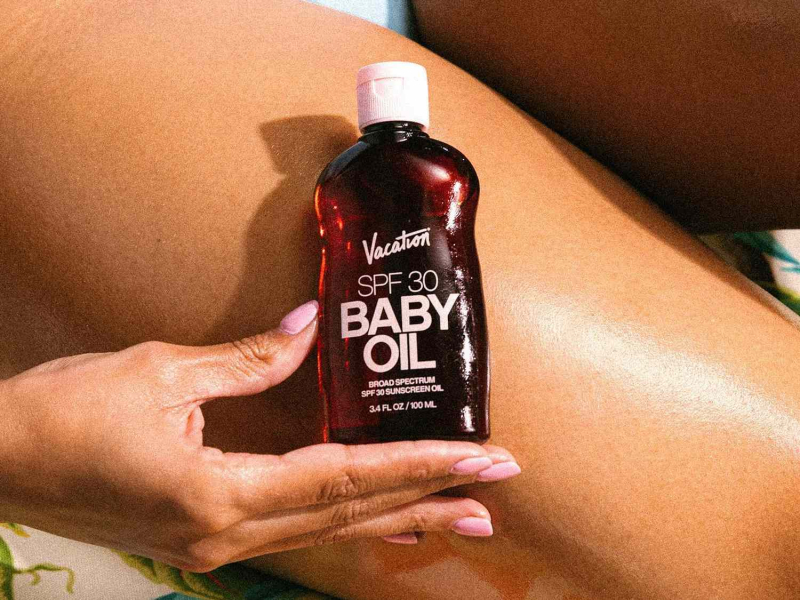
Choosing a Sunscreen Oil How to Use It The Final Takeaway
With sunscreen on the rise (as it should be), the market of SPF products has also been expanding faster than ever. Because of this, you may have noticed more sunscreen-infused makeup, sprays and sticks for reapplication, and now a growing number of sunscreen oils. Reminiscent of tanning oils in texture but infused with SPF, these products are changing the game when it comes to protecting our skin—but are they as safe and effective as a traditional sunscreen lotion or spray? Ahead, we consulted two dermatologists to learn all about sunscreen oils, from how well they work to the proper way to apply them.
Sunscreen 101
Sunscreen is a must in any routine—and you have a wide range of suitable options to find the best one for you—but there are still a few standards you should pay attention to when shopping. When it comes to sunscreen 101, the American Academy of Dermatology notes that the three basics to look for in a sunscreen are SPF 30 or higher, broad-spectrum protection (UVA/UVB), and water resistance.
Once you've nailed down the basics, phase two is picking a product that works for your skin and the occasion. If you're considering an oil formula for your next sunscreen, read on for all the details.
What Are Sunscreen Oils?
Sunscreen oils are exactly what they sound like: "Sunscreen oil is a form of sunscreen that is oil-based," says double-board-certified dermatologist Brendan Camp, MD. "It moisturizes and softens skin, leaves a sheer finish, and protects skin from ultraviolet radiation."
It’s important to note that a tanning oil with SPF is not the same thing as a sunscreen oil, as sunscreen oils typically don’t have mineral oil, which most tanning oils do have. Mineral oil can help improve skin softness and barrier function, but it also absorbs UV rays. Generally speaking, tanning oils don’t provide adequate protection, so a sunscreen oil is a better alternative to consider.
That being said, our experts note that sunscreen oils are safe and a great alternative to lotions (more on that soon). “They’re great for protecting your skin but usually have a moisturizing component, are easy to spread, and have a lighter texture than creams or lotions,” explains board-certified dermatologist Lindsey Zubritsky, MD. “It also typically gives a glowy, glazed look to the skin after application.”
Are Sunscreen Oils Really as Effective as Lotion?
Short answer: yes. “Sunscreen oils are equally as effective as any other sunscreen vehicle,” Zubritsky tells us. “As long as you are applying the appropriate amount (one ounce for the entire body), and you’re reapplying as often as you should—around every two hours, or more if you are swimming or sweating—the vehicle of the sunscreen doesn’t matter. Therefore, it’s best to pick a sunscreen that works for your skin type and that you enjoy applying. As long as it’s SPF 30 or higher, it will be effective at protecting you from the damaging UV rays.”
However, the experts note that there’s a proper way to apply sunscreen oil to ensure it’s safe and effective. “Sunscreen oils tend to be chemical sunscreens,” Camp says. “This means that the active ingredients are absorbed into the skin, where they convert UV rays into heat energy that’s then released from the skin surface. In order to be effective, sunscreen oils should be allowed to absorb into the skin for at least 20 minutes prior to sun exposure.”
How to Pick a Sunscreen Oil
Like many products currently on the market, not all sunscreens are created equally, and it’s important to find a product that works for your skin type and routine. “Look for ingredients that will complement the active ingredients in the product,” Camp says. “These may include hydrating oils and squalane, humectants like aloe or hyaluronic acid, and antioxidants like vitamin E. If you have sensitive skin, opt for [a sunscreen oil] that is free of dye or fragrance.”
When picking any SPF, including sunscreen oils, experts note that the numbers do matter—so pay attention and know that higher is usually better. “More studies are coming out showing that higher SPFs are actually more protective than lower SPFs, so finding one that’s an even higher SPF could be more beneficial to your skin,” Zubritsky says. “I like looking for hydrating ingredients in my sunscreen oil for dual benefits, as well as antioxidants to help fight environmental aggressors. One of my favorites this year is Sol de Janeiro’s Rio Radiance SPF 50 Body Oil ($38). It’s a deeply nourishing sunscreen body oil that leaves skin hydrated and glowy without feeling heavy or greasy. It contains patauá oil to nourish the skin, pongamia seed extract to protect against environmental aggressors, and mica to instantly add a gorgeous shimmer for all skin tones.”
How to Use a Sunscreen Oil
If you want your summer skin to have glowy glazed donut vibes and have decided to purchase a sunscreen oil, proper use is as important as choosing the right sunscreen. "It’s best to shake the oil prior to use and spray liberally on all sun-exposed areas approximately 15-20 minutes prior to sun exposure," Zubritsky says. "I recommend ensuring an even application by holding the spray bottle about four to six inches away. Be sure to rub it in to avoid any missed spots and reapply at least every two hours, or more frequently if swimming or sweating."
The process is similar to applying any other body oil or lotion, and adequate coverage is key. “Normal and dry skin types may be most amenable to the use of sunscreen oils,” Camp notes on who may find a sunscreen oil most beneficial. “The oils in these products will act as an emollient to soften skin and make it smoother, as well as trap moisture into skin. Oily skin types can also use sunscreen oils, but may want to be more cautious that these products do not exacerbate acne.”
The Final Takeaway
Sunscreen oils are a beneficial addition to the SPF market that provide another safe, effective option in addition to lotions, sprays, and other products. Ultimately, which to choose is up to your skin type and preferences: The key is using whichever sunscreen you like every single day (rain or shine), making sure you use the proper amount and reapply as needed. If you want to go the extra mile, "couple your sunscreen with other forms of sun protection, like sunglasses, wide-brimmed hats, UPF clothing, and umbrellas for shade," Camp tells us. This way, you'll avoid sunburn and minimize your risk of UV damage, keeping your skin happy and healthy.
Article Sources Byrdie takes every opportunity to use high-quality sources, including peer-reviewed studies, to support the facts within our articles. Read our editorial guidelines to learn more about how we keep our content accurate, reliable and trustworthy.
-
American Association of Dermatology “How Do I Know If I’m Using the Right Sunscreen?” Www.aad.org, www.aad.org/public/everyday-care/sun-protection/shade-clothing-sunscreen/choosing-right-sunscreen.
-
Rawlings, A V, and K J Lombard. “A review on the extensive skin benefits of mineral oil.” International journal of cosmetic science vol. 34,6 (2012)

